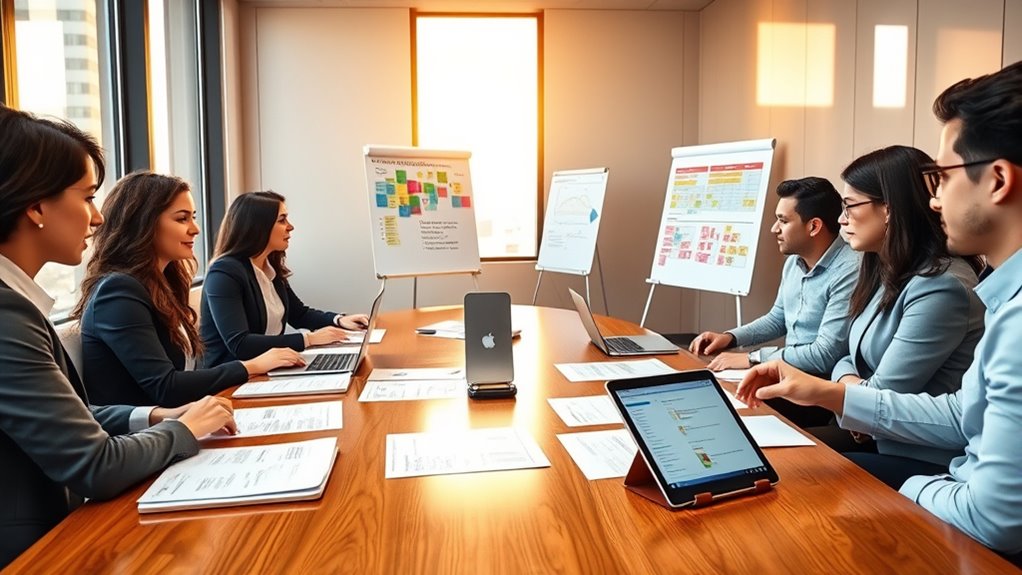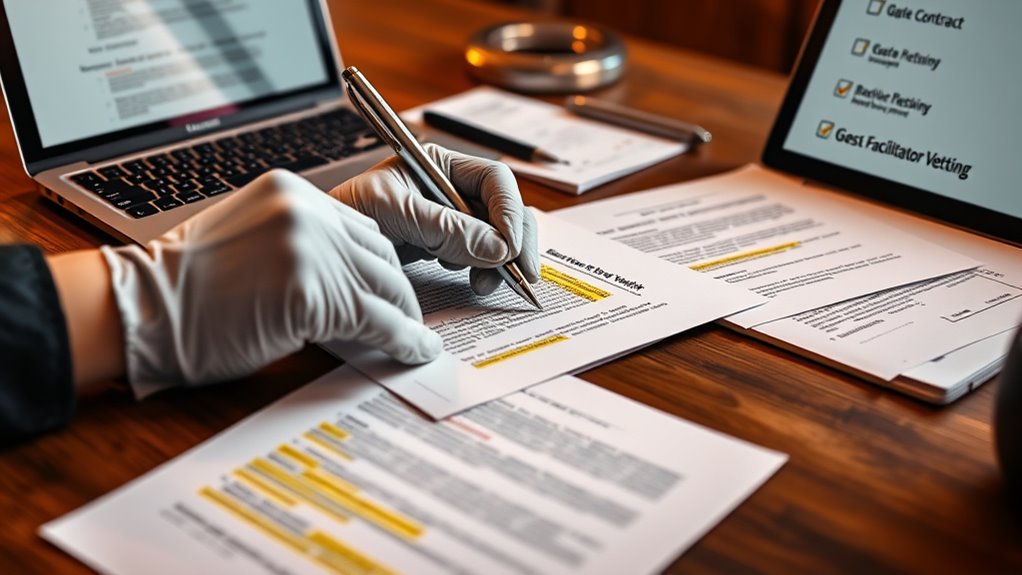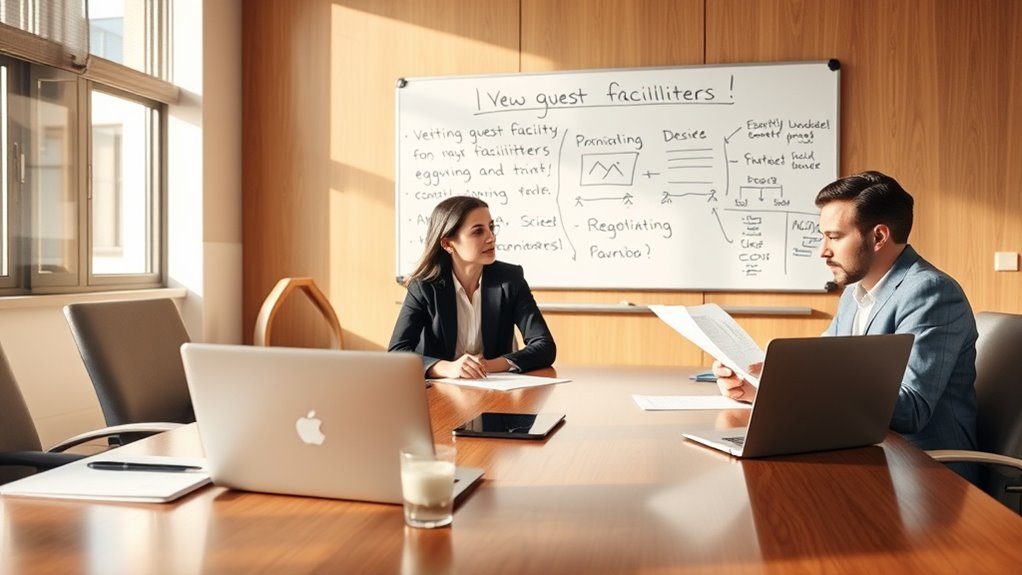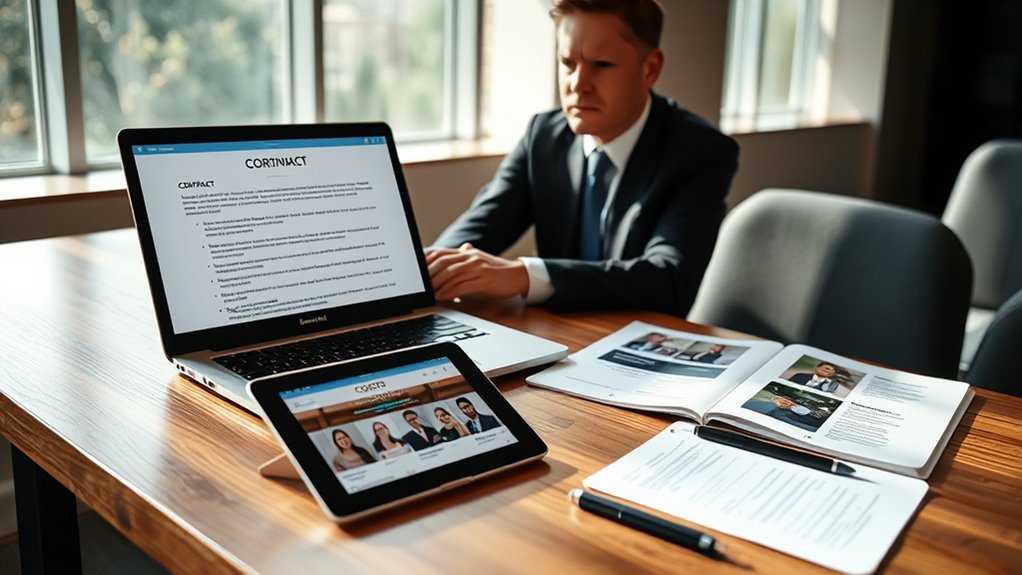To curate guest facilitators effectively, start by defining your goals and clear expectations, including roles, responsibilities, and skills needed. Hunt for diverse candidates through targeted sourcing and evaluate their experience, expertise, and cultural fit. Conduct thorough interviews and reference checks, then craft detailed contracts that specify deliverables, payment terms, and boundaries. Maintain open communication and feedback channels to guarantee a smooth collaboration—if you want to master the detailed steps, keep exploring this essential process.
Key Takeaways
- Clearly define facilitator roles, responsibilities, and expectations upfront, and document them in contracts to ensure alignment.
- Vet candidates through credential review, experience verification, and assessing cultural fit to ensure quality and suitability.
- Prepare targeted interview questions and conduct reference checks to gauge past performance and professionalism.
- Use detailed contracts outlining scope, payment terms, deadlines, and legal considerations to prevent misunderstandings.
- Establish open communication channels and feedback loops for ongoing evaluation and relationship management.
Defining Your Goals and Expectations

Before reaching out to potential guest facilitators, it’s essential to clearly define your goals and expectations. This step ensures you attract facilitators who align with your vision and foster facilitator diversity, enriching your program. Clarify what skills, experience, and perspectives are necessary to meet your objectives. Are you seeking facilitators to inspire, educate, or guide a specific group? Establishing clear goals helps you communicate your needs effectively, setting the stage for goal alignment. Consider how each facilitator’s background can contribute to a diverse and inclusive environment. When your expectations are transparent, it becomes easier to vet candidates who genuinely fit your mission. This foundation empowers you to build meaningful partnerships and create impactful sessions. Additionally, understanding your goals can assist in selecting participants with relevant experience and skills, ensuring a cohesive and effective facilitation team.
Identifying the Right Candidate Pool

To identify the right candidate pool for your guest facilitators, start by mapping out where potential candidates are likely to be found. Focus on sourcing strategies that promote candidate diversity, ensuring you reach a broad range of backgrounds and expertise. Look beyond traditional channels, such as professional networks, industry groups, and community organizations, to uncover hidden talent. Consider platforms like social media, niche forums, and academic institutions to broaden your search. It’s essential to cast a wide net to attract diverse candidates who can bring valuable perspectives and enrich your sessions. By thoughtfully applying these sourcing strategies, you’ll build a robust candidate pool that aligns with your goals and fosters an inclusive, dynamic environment.
Evaluating Experience and Expertise

Once you’ve identified a diverse pool of potential guest facilitators, the next step is to evaluate their experience and expertise to guarantee they’re a good fit. Conducting a thorough expertise evaluation involves reviewing their credentials, work history, and relevant accomplishments. You should verify their experience through direct contact with past clients or organizations, ensuring their claims align with their background. Look for specific examples of their facilitation skills, industry knowledge, and ability to engage audiences. This experience verification helps you avoid surprises later and confirms they possess the necessary expertise for your event. Additionally, understanding their familiarity with electric dirt bikes and related technology can provide insight into their overall industry knowledge. By carefully appraising these areas, you ensure your guest facilitator’s qualifications match your expectations, setting the stage for a successful and impactful session.
Assessing Compatibility With Your Event or Program

Evaluating whether a guest facilitator aligns with your event or program is essential to guarantee a seamless experience. Start by considering cultural alignment—does their background, values, and approach resonate with your audience’s expectations? It’s also vital to assess personality compatibility; a facilitator whose communication style and energy complement your team and attendees will foster engagement and authenticity. If their presence feels natural and supportive, the event will run more smoothly. Trust your instincts about how well they’ll mesh with your environment. Confirm that their values and demeanor match your program’s tone to prevent disconnects. Ensuring cultural alignment, personality compatibility, and understanding influence of AI on music creation helps create a coherent, impactful experience that benefits both your organization and your participants.
Conducting Effective Interviews and References

Conducting effective interviews and checking references are critical steps to guarantee your guest facilitator is the right fit. To do this well, focus on sharpening your interview techniques and thorough reference checks. Here are three key actions:
- Prepare targeted questions that reveal experience, adaptability, and communication skills.
- Use behavioral interview techniques to uncover past performance and problem-solving abilities.
- Contact references with specific questions about reliability, professionalism, and teamwork.
These steps help you gather genuine insights beyond resumes. Effective interview techniques ensure you’re asking the right questions, while diligent reference checks validate claims and provide context. Both are essential for making informed decisions, ultimately ensuring your guest facilitator aligns with your event’s goals and standards.
Clarifying Roles, Responsibilities, and Deliverables

To guarantee smooth collaboration, you need to clearly define the facilitator’s scope and set specific expectations for deliverables. It’s important to outline role boundaries so everyone understands their responsibilities and avoids overlap. Clarifying these points upfront helps prevent misunderstandings and keeps the project on track. Incorporating clear communication about roles and expectations is essential for successful facilitation.
Defining Facilitator Scope
How can you guarantee that everyone involved understands what a facilitator is expected to do? Clearly defining the facilitator scope is essential. First, outline the specific role boundaries, so everyone knows what responsibilities fall under the facilitator’s purview. Second, specify key responsibilities, such as guiding discussions or managing time, to prevent overlap with other roles. Third, detail deliverables, like session summaries or action plans, to ensure clarity on outcomes. This precision helps avoid confusion, overlaps, or missed expectations. Additionally, understanding the bedroom environment can help tailor facilitation strategies to suit the setting’s specific needs. By establishing clear role boundaries and a thorough scope, you create a shared understanding that keeps your facilitation process smooth and effective. Remember, well-defined scope minimizes miscommunication and maximizes facilitator impact.
Outlining Deliverable Expectations
Clarifying deliverable expectations is essential to guarantee everyone understands what they are responsible for and what the final outputs should be. When outlining these expectations, focus on clear communication of facilitator branding and session branding goals. Define specific deliverables, such as presentation materials, session summaries, or post-event follow-ups. Use this table to align your team:
| Deliverable | Responsible Party | Deadline |
|---|---|---|
| Session outline | Guest Facilitator | Two weeks prior |
| Branding assets | Marketing Team | One week prior |
| Feedback report | Facilitator | One week post |
This helps prevent misalignment, ensures smooth collaboration, and guarantees the facilitator’s contributions meet your event’s branding standards. Clearly set expectations upfront to streamline the process and deliver impactful sessions. Additionally, referencing content standards can help ensure all materials align with your organization’s guidelines.
Clarifying Role Boundaries
Establishing clear role boundaries prevents confusion and overlaps during the facilitation process. Boundary clarification guarantees everyone understands their responsibilities and limits. To achieve this, consider these steps:
- Define specific roles and responsibilities upfront, so each participant knows their scope.
- Communicate expectations clearly, emphasizing what falls within and outside their duties.
- Document these boundaries in your contract or agreement, providing a reference point for everyone.
- Incorporate considerations such as color accuracy and contrast ratio to ensure visual clarity and consistency in presentations and materials.
Drafting Clear and Comprehensive Contracts

Creating clear and thorough contracts is essential to make sure both you and your guest facilitators understand your expectations and obligations. A well-drafted contract enhances contract enforceability by clearly defining roles, deliverables, and deadlines. It also addresses legal considerations, such as intellectual property rights, confidentiality, and liability limits. Use precise language to avoid ambiguity, ensuring all parties know what’s expected. Keep the scope detailed but manageable, including payment terms, cancellation policies, and dispute resolution processes. Remember, a comprehensive contract protects both you and your guest facilitator, reducing misunderstandings and legal risks. Review local laws to ensure your contract complies with applicable regulations. Additionally, understanding contract enforceability can help ensure your agreements hold up in legal situations. By prioritizing clarity and completeness, you set a solid foundation for a successful collaboration.
Negotiating Terms and Setting Expectations

When negotiating terms, you need to clearly define the facilitator’s role responsibilities and expected session outcomes to avoid misunderstandings. Make sure you discuss and agree on compensation details upfront so both parties are on the same page. Setting clear expectations helps guarantee the session runs smoothly and meets everyone’s objectives. Additionally, reviewing best practices for vetting potential facilitators ensures you select qualified candidates who align with your goals.
Clarify Role Responsibilities
Have you ever wondered how to guarantee both parties understand their responsibilities clearly? Achieving role clarity is essential for a smooth collaboration. To do that, focus on:
- Defining specific responsibilities to set clear responsibility boundaries.
- Communicating expectations upfront to avoid misunderstandings.
- Documenting agreed-upon roles to serve as a reference.
Establish Compensation Details
To guarantee both parties are on the same page, it’s essential to negotiate clear compensation terms early in the process. Define your payment structure upfront, deciding whether you’ll offer a flat fee, hourly rate, or honorarium. Refer to honorarium guidelines to ensure your offer aligns with industry standards and respects the facilitator’s expertise. Be transparent about what’s included—travel, accommodations, or additional expenses—to prevent misunderstandings later. Clarify payment timelines and methods, such as check or electronic transfer, so everyone knows when to expect funds. Setting these expectations early helps build trust and smooths the collaboration. Document all agreed-upon terms clearly in your contract, guaranteeing both you and your facilitator are aligned before moving forward.
Define Session Outcomes
Once you’ve established the compensation details, the next step is to clarify what success looks like for your session. Setting clear session outcomes ensures everyone aligns on expectations and goals. Consider these key points:
- Define measurable objectives that guide the session, such as specific skills or knowledge participants will gain.
- Decide how you’ll evaluate success through session evaluation forms and participant feedback.
- Clarify how these outcomes will influence future sessions and facilitator performance.
Establishing Communication and Feedback Channels

Effective communication and feedback channels are essential for ensuring smooth collaboration with guest facilitators. Clear communication channels help you stay aligned on expectations, timelines, and session details. Establishing regular feedback loops allows you to address concerns promptly, adapt plans when needed, and maintain transparency. You might set up weekly check-ins or use collaborative tools like email, messaging apps, or project management platforms to facilitate ongoing dialogue. Encourage open feedback from facilitators to identify potential issues early and improve the overall experience. By proactively managing these channels, you foster trust and accountability, ensuring everyone remains informed and engaged throughout the collaboration. Strong communication and feedback loops ultimately lead to more effective sessions and a positive working relationship.
Preparing for a Successful Collaboration

Preparing for a successful collaboration starts with setting clear goals and expectations from the outset. To guarantee your guest facilitator’s success, consider these key steps:
Clear goals and expectations are vital for a successful guest facilitator partnership.
- Define objectives that promote facilitator diversity, encouraging varied perspectives and experiences.
- Communicate your expectations clearly, emphasizing the importance of cultural sensitivity to respect different backgrounds.
- Prepare logistical details, including schedules, resources, and support, to foster a smooth partnership.
Frequently Asked Questions
How Do I Handle Last-Minute Cancellations by Guest Facilitators?
When facing last-minute cancellations, you should rely on your cancellation policies to guide your response. Communicate promptly with your audience and offer alternative solutions, like rescheduling or finding a replacement. Use contingency planning to prepare for such events, such as having a list of backup facilitators. This approach minimizes disruptions and maintains professionalism, ensuring your event runs smoothly despite unforeseen changes.
What Legal Considerations Should I Include in the Contract?
Oh, the joys of legal fine print—because who doesn’t love a good liability waiver? When drafting your contract, you should include clauses on intellectual property rights, clarifying who owns content created during facilitation. Also, don’t forget liability waivers to protect you from unforeseen mishaps. These legal considerations guarantee your organization’s rights are clear and risks minimized, making sure everyone plays by the rules and you stay out of court.
How Can I Ensure Diversity and Inclusion in My Guest Facilitator Roster?
To guarantee diversity and inclusion in your guest facilitator roster, focus on promoting cultural representation and equitable opportunities. Actively seek out facilitators from varied backgrounds, and develop outreach strategies that reach underrepresented communities. Incorporate inclusive language in your outreach materials and selection criteria. Regularly review your roster to identify gaps, and foster an environment where all voices are valued. This proactive approach helps create a diverse, enriching experience for everyone involved.
What Are Common Pitfalls in Vetting Guest Facilitators?
Oh, the irony—you’d think vetting guest facilitators is straightforward, but facilitator bias and skipped credential verification often trip you up. You might overlook biases or trust credentials blindly, only to find surprises later. The common pitfalls include neglecting thorough background checks and not questioning assumptions. To avoid this, actively scrutinize credentials and be aware of facilitator bias—these steps help guarantee you select truly qualified, diverse, and unbiased facilitators.
How Do I Measure the Success of a Guest Facilitator After the Event?
You measure a guest facilitator’s success by analyzing participant feedback and engagement metrics. Pay attention to how attendees respond through surveys or comments, noting their satisfaction and insights. Track engagement during the event, such as questions asked or activities participated in. If feedback is positive and engagement is high, you’ve likely achieved your goals. Consistently reviewing these indicators helps you determine if the facilitator effectively contributed to your event’s success.
Conclusion
By thoughtfully selecting and carefully partnering with your guest facilitators, you set the stage for a seamless and enriching experience. When you nurture open communication and clear agreements, you’ll find the collaboration flows smoothly, even when surprises come along. Embrace the journey of co-creation, knowing that your attentive approach gently guides everyone toward shared success. With this foundation, your event will naturally flourish, leaving everyone inspired and enthusiastic for what’s next.









